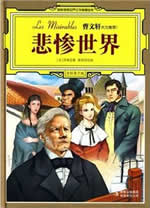THE coterie1 was the most select in the Casino. Its members used to meet there in order to speak ill of everybody. There were young men who did nothing but ride horseback, try the strength of young bulls by prodding2 them with long pikes from horseback, and gamble their souls away; old men whose sole occupation was talking politics; and a great variety of persons who had made a business of amusing themselves—a fact which did not prevent one from reading a gloomy weariness in their expressions.
This meeting of aristocrats3 and plebeians4, of rich men and poor men, of vagrants5 employed and unemployed6, possessed7 a rare character, which was produced by a preponderance of aristocratic prejudices, mixed with a great simplicity8.
In this coterie, so democratic in appearance, high and low had their say; even the waiters in the Casino mixed in the conversation. It possessed those characteristics, partly affable, partly coarse, that the Spanish aristocracy had had until foreign ideas and customs began to transform and polish it.
In that meeting one gleefully flayed9 one’s neighbour. Amid jests and laughter, flagellated by jovial10 satire11, every person of significance in the town marched in review, either on account of their merits or their vices,[183] their stupidity or their wit. If one believed what was told there, the city was a hot-bed of imbroglios12, obscenities, wild escapades.
Among the members of aristocratic families there was a multitude of alcoholics13 and diseased individuals; the rotten produce of vicious living and consanguineous marriages. In these families there were a great many men who seemed to be obsessed14 with the idea of going through their fortunes, of ruining themselves quickly; others travelled the road to ruin without meaning to, through the robbery of their administrators15 and usurers; the majority were simply idiots; the clever ones, the clear-sighted ones, went to Madrid to play politics, leaving the old ancestral homes completely dismantled16.
The scandals of the masses were mixed with those of the aristocracy; and the ingenuous17 jests of the charcoal-burners, and the dissolute wit of the Celestinas, were repeated and applauded with relish18.
They spoke19, too, and constantly, of the bandits of the Sierra; they knew who their protectors were in and out of Cordova, where their hiding-places were: and this friendship with bandits was not looked upon as a disgrace, but rather as something that constituted, if not a glorious achievement, at least a spicy20 and piquant21 attraction for the town.
“The gangs are organized in the very jail itself, while the bandits walk about the city.”
“But, is that true?” asked some horrified22 stranger.
“Everything you hear is,” they told him with a laugh. “Even the abductions of Malaga and Seville are planned here.”
“And why don’t you put an end to the evil?”
When the Cordovese heard this he smiled at the[184] stranger, and added that in Cordova they had never looked upon the horsemen as an evil.
While the aristocrats and plebeians gave food for gossip, the middle class worked: lawyers, priests, and merchants enriched themselves, conducted their business, while a cloud of citizens from Soria fell like locusts23 upon the town, and took possession of the money and lands of the old, wealthy families by means of their evil skill at money-lending and usury24.
One evening in the early part of autumn, several gentlemen were chatting in one of the salons26 of the Casino. They were members of the early coterie. Some were reading newspapers, and others were talking, seated upon divans27, or walking to and fro.
Springer, the Swiss watch-maker’s son, had come in to read a newspaper, and as he read, he heard them talking about his friend Quentin, whom he had not seen for some time. He listened attentively28.
“But is it true he has come into some money?” asked a stout, red-faced gentleman with a grey moustache.
“I don’t know,” answered a bald-headed man with a black beard. “He undoubtedly29 has money. They say that he has bought a house for María Lucena.”
“I don’t believe that.”
“Quentin is a child of good luck,” added another.
“I should say he is,” responded he of the black beard. “Lucky at cards, and lucky at love.”
“Couldn’t the Marquis have given him some money?” asked the stout gentleman.
“The Marquis! He hasn’t a penny.”
“But where does the boy get his money?”
“I don’t know—unless he steals it.”
“But that would be found out.[185]”
The members of the coterie were all silent for a moment while the stout gentleman took a short nap; then he said:
“Do you know if that paper that has just been published is his?”
“What paper? La Víbora?” asked he of the bald head.
“Yes.”
“I don’t think so.”
“Well, they say it is.”
“It strikes me that that paper is owned by the Masons.”
“Oh, but don’t you know that Quentin is a Mason?” said a small, dark man with a black moustache.
“Really?” asked every one at once.
“Yes, indeed. I know it for a fact; he joined the Lodge30 this summer.”
“Perhaps he makes his living from that,” said the fat gentleman.
“No one makes a living from that,” replied the short man with a laugh. “It occurred to me when I was a student in Madrid to become a Mason, and do you know what happened? They carried me about from one place to another with my eyes bandaged, and ended by taking five dollars away from me.”
Every one laughed. At this point a young man entered and stretched out in an arm chair with an air of deep gloom.
“What’s up, Manolillo?” asked the bald-headed man.
“Nothing. Quentin is upstairs plucking everybody. If he quits in time, he’s going to come out ahead; if he stays in, he may lose everything.[186]”
As Springer, who heard this, was a man of good intentions and a loyal friend, he arose, threw his paper upon the table, left the salon25, went through a gallery paved with marble, up a flight of stairs, and entered the gambling31 hall.
Quentin was dealing32; he had a pile of bills and gold coins before him. Springer went up to him, and put his hand upon his shoulder. Quentin turned.
“What is it?”
“I come,” said Springer in a low voice, “to give you the advice of a gambler who just left here completely plucked. He said that if you quit in time, you’ll come out ahead; if you stay in, you may lose everything.”
“Really?” exclaimed Quentin, rising, as if he had just received important news. “Well, then, the only thing I can do is to leave. Gentlemen,” he added, addressing the players, “I shall return in a little while,” and placing the bills in his folder33, he rapidly picked up the gold coins.
A murmur34 of indignation arose among the players.
“Come!” said Quentin to Springer.
They left the hall rapidly, descended35 the stairs, and did not stop until they had reached the street.
“But, what has happened to you?” the Swiss asked, utterly36 surprised.
“Nothing; it was a stratagem,” answered Quentin with a smile. “I could not find the right moment to leave decorously. They were all after me like dogs; and there I was boasting like a man to whom four or five thousand dollars more or less are of little importance. They would have gone up in smoke soon.”
By the light of a lamp, Quentin pulled out a handful of bills, sorted them, and put them into a folder; and[187] then, unbuttoning first his coat, and then his vest, he put them in his inside pocket.
“Aren’t you afraid something may happen to you in the street?” asked the Swiss.
“Ca!”
“Do you know that you are the talk of the town, Quentin?”
“Am I?”
“Really. Besides, you have a tremendous reputation.”
“As what?”
“As a Tenorio, a dare-devil, a gambler, and a Mason.”
Quentin burst out laughing.
“I heard in the Casino here,” Springer went on, “that you were not living at home any more, but with an actress.”
“That’s true.”
“Have you quarrelled with your family?”
“Yes; I got angry and left my stepfather. Usurers disgust me.”
“It also seems that you have received a legacy37 from some relation or other of yours. Is that true?”
“Boy, I don’t know,” said Quentin ingenuously38. “I’ve invented so many things, that now I don’t know which is the truth and which is a lie.” Then, turning melancholy39, he added, “The trouble with me is that I am out of my element. I’m a Northerner.”
“You!” said Springer; and he began to laugh so heartily40 that Quentin joined him.
“What are you laughing at?”
“At how well I know you. So you are a Northerner. What a faker you are!... What shocks me is that you have become a Mason. That’s absurd.[188]”
“Yes; it’s absurd to you and me, but it isn’t to many people.”
“Where is your Lodge?”
“In the Calle del Cister, near the Calle del Silencio. Would you like to come?”
“What for?”
“Man, we’ll baptize you anew; we’ll call you Cato, Robespierre, Spartacus....”
“I don’t believe it’s worth while....”
“As you wish.”
“It is ridiculous, but it serves for something: it is useful for propaganda.”
“What propaganda are you putting forward?”
“Just now I am a Federal Republican.”
Springer burst out laughing again.
“You’re a Federal Republican! Like my countrymen, the Swiss.”
“You think it’s funny?”
“Very, my lad. You couldn’t live if you went to Switzerland.”
“Well, then, there I would be a Monarchist. I am nothing at heart. I am a man of action who needs money and complications in order to live. Do you know what name they have given me at the Lodge?”
“What?”
“Catiline. They have hit the nail on the head. I am a little Catiline. What an admirable chap was that Tribune of the people! Eh? I am very enthusiastic about him.”
“Then, Cicero would seem despicable to you.[189]”
“Ah! absolutely despicable. Charlatan42, pedant43, coward ... in other words—he was a lawyer.”
“Listen,” said the Swiss. “They told me another and more serious thing: that you are the one who edits that newspaper, La Víbora. Is that true?”
“Yes.”
“Are you the author of those very violent satires44?”
“Not the author; the inspirer. Catiline turned libeller?... It would be unworthy of him.”
“But don’t you realize that you are exposing yourself to a very serious danger?”
“Ca! Don’t you believe it. Men are more cowardly than they seem. Moreover, I am defended by a lot of people; first by those who rejoice over and enjoy the satires—as long as they are not directed against themselves; second, by my friends, of whom the majority are very powerful people; third and last, and this is what I place most confidence in, I am defended by these fists, and because I don’t give a fig45 for anybody.”
“Well, you certainly are acting46 without scruple47 or conscience.”
“Is it worth while to live otherwise? I believe not.”
“Man alive! That depends upon the way one looks at it.”
“That’s the way I look at it. The spectacle is dangerous, but amusing. Well? Are you coming to the Lodge?”
“What for?”
“You will hear several orators48 declaim their speeches, and I shall present you to Don Paco Sánchez Olmillo, Master Surgeon and Master Mason. If you wish I’ll make a speech in your honour on human liberty. It is a discourse49 which I have learned by heart, and which, with a few trifling50 changes, I turn loose on all occasions, making it seem different each time.[190]”
“The plan does not tempt51 me.”
“Then if you don’t wish to go to the Lodge, I shall take you to the tavern52 in the Calle del Bodegoncillo.”
“What are you going to do there?”
“I’m going to pay my retinue53. Then I shall present you to Pacheco.”
“To which Pacheco? To the bandit?”
“The same. He is my lieutenant54.”
“The devil! Shall I be safe with you?”
“Yes; safer than if you were with the Alcalde.”
“But you keep very bad company.”
“Whom do you mean by that? Pacheco? Pacheco is an unfortunate chap. Ask any one, and they will tell you that he was forced to take to the mountain merely on account of a rooster.”
“Was that all?”
“That was all. On account of a rooster called Tumbanavíos or Tumbalobos, I don’t exactly remember which. Pacheco used to go to the cock-fighting ring in the Calle de las Doblas, and one day he got mixed up in an argument with a fellow as to the relative merits of two fighting-cocks ... and, well, they had words. Pacheco stuck a knife into the fellow, with bad results, and left him cold.... A man’s affair!” added Quentin resignedly.
“Then one of those sergeants55 of the guardia civil who like to stick their noses into everything, insisted upon hunting Pacheco. He gave chase to him and caught up to him; but Pacheco, seeing that the game was about up, and remembering the words of Quevedo: that it is better to be ahead by a blow in the face than by all Castile, discharged his fowling-piece at the guard. This also had[191] bad results, for he blew his skull56 open and sent him to join the other fellow.”
The Swiss applauded the story, laughing quietly.
“And is that chap from this city?” he asked.
“I think he is from Ecija or thereabouts.”
“What kind of a man is he?”
“A good fellow.”
“Does he hurt any one in the country?”
“No. He appears at a farmhouse57 and asks the operator for a loan of ten or twelve dollars, and the operator gives it to him. He’s a good man.”
“Is he in Cordova now?”
“Yes.”
“Why don’t they arrest him?”
“They don’t dare. Don’t you see that I am protecting him?”
The Swiss looked at his friend, whom he admired deep down in his heart, and murmured again and again:
“My, what a faker!”
“It has been my custom to invite him to dine with me in the Café Puzzini and in the Rizzi Tavern,” added Quentin, “and no one has dared to interfere58 with him.”
Conversing59 in this manner, they had come out upon Las Tendillas, and were going up the Calle de Gondomar toward the Paseo del Gran Capitán. They walked past San Nicolás de la Villa60, and followed the Calle de la Concepción toward the Puerta de Gallegos.
A strong breeze was blowing which made the blinds and windows rattle61 noisily.
“Where is that tavern?” asked Springer.
“Right here,” answered Quentin. “This is the Calle del Niño Perdido, a sort of cul-de-sac; it is not ours.[192] This other is the Calle de los Ucedas; nor is that the one we are looking for, either.”
They walked on a few paces.
“This is the Calle del Bodegoncillo,” said Quentin, “and here is the tavern.[193]”







